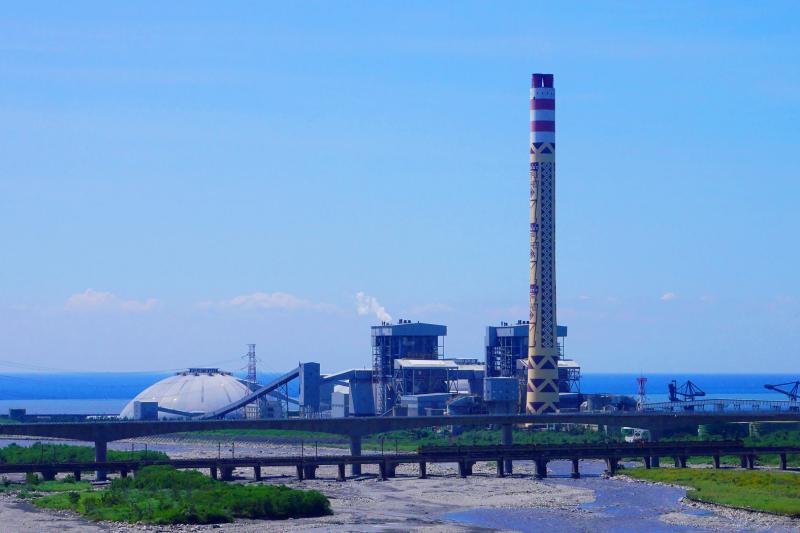The Environmental Protection Administration (EPA) yesterday demanded that the coal-fired Ho-Ping Power plant in Hualien County submit additional documents for further environmental review over its request to increase coal imports from Australia.
The agency made the remarks after an Environmental Impact Assessment (EIA) Committee convened earlier in the day to discuss the plant’s plan to import more Australian coal.
The plant has been searching for new sources of coal since a self-imposed ban on coal imports from Russia and Indonesia’s ban on coal exports have reduced the nation’s coal supplies.

Photo: Wang Chun-chi, Taipei Times
The plan to import more Australian coal would be necessary to maintain the plant’s operations, it said.
Over the past decade, Australia exported 42.4 percent of the world’s coal, while 43.4 percent came from Indonesia, 14 percent from Russia and 2 percent from South Africa, the plant said.
The plant requested more flexibility in coal sources to ensure a stable supply of electricity, as coal that produces medium to low levels of the particulate pollutant coal ash is difficult to source.
The plant estimates that the firing process of Australian coal, which contains a high level of coal ash, would lead to a one-third increase of bottom ash and fly ash byproduct.
It requested the coal ash cap be raised from 12 percent to 16 percent, adding that the additional bottom ash and fly ash byproduct would be reused by the nearby Hoping Cement Plant to minimize the environmental impact.
However, EIA committee members stated that as pollutants increase, the plant would need more electricity and vehicles to remove the waste, which would contribute to carbon emissions.
The committee added that it was concerned about the impact of heavy metal contamination on local health and the environment, as the amount of lead and cadmium contained in Australian coal is still not entirely known.
The committee asked the plant to submit a report analyzing the different types of coal and their respective environmental impacts.
To modify an already approved EIA, the plant would need to show that the total amount of pollutants would not increase when using more Australian coal.
If the committee approves the plant’s report, the plan would then need to be accepted by the EPA before being adopted.

Chinese spouse and influencer Guan Guan’s (關關) residency permit has been revoked for repeatedly posting pro-China videos that threaten national security, the National Immigration Agency confirmed today. Guan Guan has said many controversial statements in her videos posted to Douyin (抖音), including “the red flag will soon be painted all over Taiwan” and “Taiwan is an inseparable part of China,” and expressing hope for expedited reunification. The agency last year received multiple reports alleging that Guan Guan had advocated for armed reunification. After verifying the reports, the agency last month issued a notice requiring her to appear and explain her actions. Guan

GIVE AND TAKE: Blood demand continues to rise each year, while fewer young donors are available due to the nation’s falling birthrate, a doctor said Blood donors can redeem points earned from donations to obtain limited edition Formosan black bear travel mugs, the Kaohsiung Blood Center said yesterday, as it announced a goal of stocking 20,000 units of blood prior to the Lunar New Year. The last month of the lunar year is National Blood Donation Month, when local centers seek to stockpile blood for use during the Lunar New Year holiday. The blood demand in southern Taiwan — including Tainan and Kaohsiung, as well as Chiayi, Pingtung, Penghu and Taitung counties — is about 2,000 units per day, the center said. The donation campaign aims to boost

The Kaohsiung Tourism Bureau audited six hotels in an effort to prevent price gouging ahead of Korean band BTS’ concert tour in the city scheduled for Nov. 19, 21 and 22 this year. The bureau on Friday said that the audits — conducted in response to allegations of unfair pricing posted on social media — found no wrongdoing. These establishments included the local branches of Chateau de Chine, Hotel Nikko, My Humble House, and Grand Hai Lai, it said, adding that the Consumer Protection Commission would have penalized price gougers had the accusations been substantiated. The bureau said the Tourism Development Act

The military yesterday said it has located the flight data recorder, or black box, of an F-16V jet that disappeared off eastern Taiwan earlier this month, and it would soon deploy a salvage team to try to retrieve it. Air Force Command Headquarters said that while it had pinned down the location of the black box, it was still searching for the aircraft’s sole pilot, air force Captain Hsin Po-yi (辛柏毅). Without providing details, the air force said it had located the black box days after detecting some intermittent signals and would now engage a team of professionals to retrieve it. The air